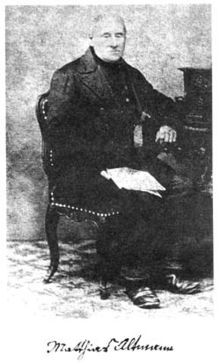Matthias Altmann
Matthias Augustin Altmann (born on February 24, 1790 in the "Pflegerstöckl" of Erlach Castle near Kallham (then the district authority of Schärding ); died on April 28, 1880 in Neumarkt im Hausruckkreis ) was an Austrian poet and author of an agricultural didactic poem.
Life
Altmann's father was a lawyer and carer of the Count Weissenwolff rule in Erlach. Altmanns first attended the parish school in Kallham and then the Benedictine school in Kremsmünster . In the Napoleonic Wars he first fought on the Austrian side in 1809 in the Battle of Aspern and the Battle of Wagram , but had to fight on the Bavarian side from 1813 after the Innviertel had become Bavarian. After the Congress of Vienna he was back in Austrian service and became an officer in the Kuk Salzburg-Upper Austrian Infantry Regiment "Archduke Rainer" No. 59 . After the death of his father in 1821 he bought a farm in the Hausruckviertel , the "Nigelgut" in Damberg near Taufkirchen an der Trattnach, from his inheritance . In 1826 he married the farmer's daughter Maria Höfler, with whom he had three children. In 1860 he handed the farm over to his son and lived until his death in house number 94 of the Freyung in Neumarkt im Hausruckkreis, where a street is named after him today.
In 1828 Altmann wrote the Upper Austrian Georgicon , a didactic poem in hexameters in the tradition of Virgil's Georgica , which also has influences from Johann Heinrich Voss Idyll Luise and Goethe's Hermann and Dorothea . The first verses read:
You, immortal Virgil! You singer of lovely songs
Who sang about the business of the never-resting farmer,
I would like you to imitate ; but the deity does not live in me who
nourished the heavenly spark in your bosom!
Italy's mild sky does not smile to me from afar.
The villa shines for me not in Naples' splendid country,
Oranges do not smell the sweetest smells of bliss for me.
In the shade of the trees my house stands friendly to me,
surrounded by fertile fields, overgrown with trees,
and by green meadows, which stretch down to the brook,
which creeps through the alders. Alone, be our region
,
no matter
how lovely and fertile it is, it remains only dry prose
against Italy's country, and with sweet Falerner
and comfortable rest, a song may be more successful than
with bitter must and power-shaking work.
The poem, divided into 15 chants, is autobiographical and didactic and gives a lifelike depiction of the rural economy in the Hausruckviertel in the spirit of literary enlightenment, shaped by Christian ethics and a thoroughly patriotic spirit, as a dialogue between the poet and his wife after going to church in song 3 shows :
Because Austria's hard-working, peaceful people live here,
who cultivate the soil of their fathers with joyful courage, who
still keep the pious faith in God in their hearts
and then confidently stand there above all the changes of terrible fate
! - Other peoples are not like that:
They believe they have a high calling to master the state,
each according to his desire; therefore, because this cannot be,
they are dissatisfied with God and their ruler.
Originally the poem was only intended for social entertainment in private circles, but in 1845 it was printed in Vienna at the instigation of Archduke Johann .
Works
- Upper Austrian Georgicon. A didactic poem depicted in a family painting. Methitarist printing works, Vienna 1845, digitized .
literature
- Wilhelm Haefs: Altmann, Matthias . In: Wilhelm Kühlmann (Ed.): Killy Literature Lexicon . Authors and works from the German-speaking cultural area. 2., completely revised Ed. De Gruyter, Berlin 2008, vol. 1, p. 112.
- Altmann. In: Ferdinand Krackowitzer, Franz Berger: Biographical Lexicon of the State of Austria above the Enns. Passau & Linz 1931, p. 8.
- Johann Weidenholzer: Matthias Altmann. A forgotten Upper Austrian poet. In: Heimatkunde. 2nd issue. Publications of the society for the care of the Rieder Heimatkunde, Ried, Innkreis 1909, S. 114-121, online .
Individual evidence
- ↑ The mother Josefa, née Werloschneck (or Weloschnigg) de Bernburg, died in 1810.
- ↑ 48 ° 16 '16.9 " N , 13 ° 43' 48.4" O .
- ^ Upper Austrian Georgicon . Vienna 1845, 1st chant, v. 1 ff., P. 3 f.
- ^ Upper Austrian Georgicon . Vienna 1845, 3rd song, p. 17 f.
Web links
- Literature by and about Matthias Altmann in the catalog of the German National Library
| personal data | |
|---|---|
| SURNAME | Altmann, Matthias |
| ALTERNATIVE NAMES | Altmann, Matthias Augustin (full name) |
| BRIEF DESCRIPTION | Austrian poet |
| DATE OF BIRTH | February 24, 1790 |
| PLACE OF BIRTH | Erlach Castle (Kallham) |
| DATE OF DEATH | April 28, 1880 |
| Place of death | Neumarkt in the Hausruckkreis |
